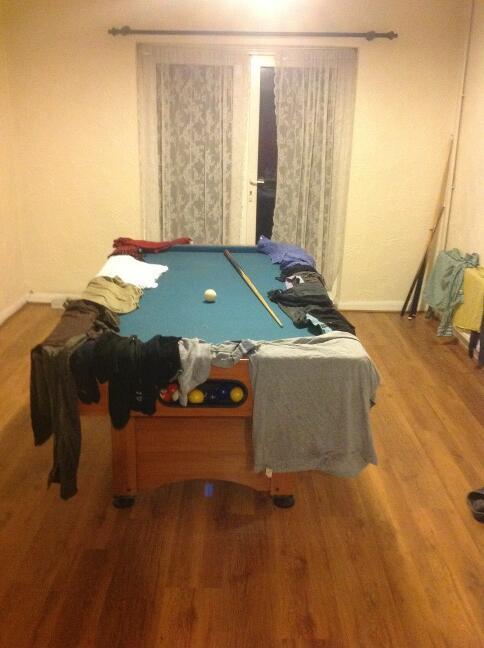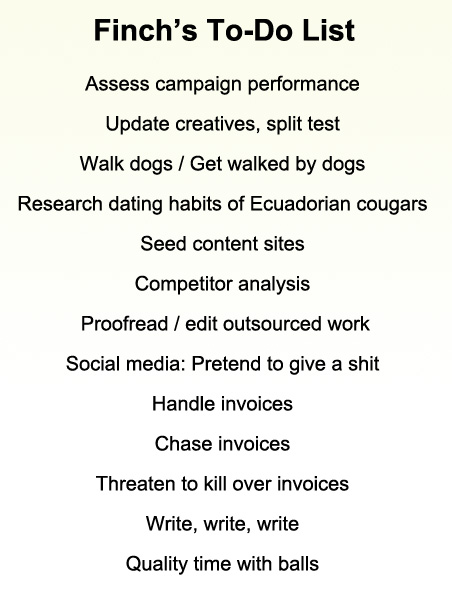How to Delay Gratification in a World of Immediate Distractions
Delayed gratification is the theory behind the old saying, “Good things come to those who wait“. It is our ability to resist the temptation of an immediate reward in favour of a larger prize in the future.
Numerous studies have shown the ability to delay gratification as one of the biggest indicators of success through life.
It can be relevant in so many ways; from your ability to budget, to the type of woman you wake up next to, to your willingness to stoneface a Sausage & Egg McMuffin in favour of training for a marathon at 5am. The latter of which, in my case, will never ever happen.
Those who can resist temptation in pursuit of long-term goals are blessed with an enormous advantage over the playing field. It is the essence of focus, concentration, productivity and even the classic quote that an affiliate can’t go 7 hours without seeing on Facebook:
ENTREPRENEURSHIP IS LIVING A FEW YEARS OF YOUR LIFE LIKE MOST PEOPLE WON’T SO THAT YOU CAN SPEND THE REST OF YOUR LIFE LIKE MOST PEOPLE WON’T
Looking at the career of Internet Marketers, many of us were exceptionally good at delaying gratification when we made the jump to running our own businesses. But it doesn’t always stay that way.
In a rather cruel twist of fate, the more successful you become, the more distractions that entwine their way in to your life. It’s kind of like Muse, the band. Does anybody remember how awesome Muse were in 2002-2003?
Here’s a reminder:
http://www.youtube.com/watch?v=3H0hQpA-Ho8
Fast forward ten years and you’ll find a caricature of a space rock trio who have clearly spent too much time indulging in fantasies of the apocalypse. If Matt Bellamy spent less time playing with his [admittedly very rich] balls on Above Top Secret, and more hours alone with his guitar, he’d probably write better rock songs.
Many artists produce their best work when the rewards and recognition are nowhere to be seen. It takes a special personality to cancel out the white noise; to produce the best possible work; when distraction is all around him. And that’s what success brings: distraction.
Vincent van Gogh, one of the greatest painters of the last 300 years, died alone and depressed. You could count on one hand the number of people that appreciated his work. Van Gogh’s tragedy, among many, was that he blew his brains out before seeing the recognition he deserved. But it does go some way to explaining why that work is so highly regarded, particularly for its emotional honesty.
There are only so many distractions that one man, a paintbrush and his mental illness has to bear. The product of that delayed gratification – van Gogh’s lifetime battle with depression and introspection – is what we now call genius.
I’m not suggesting for a moment that the way to get in touch with your best possible work is to despair and retreat from the world. But I do believe that anybody who has the privilege of working from home has to become fine-tuned to his ‘levels of comfort’.
Too much comfort is a bad thing.
Too many distractions will fuck with your ability to see straight through them and catch the bigger prize.
On a personal level, this isn’t something I had to worry about before I quit my day job.
For a period of several months, I would work all day in the city, and then all night in my bedroom. There’s very little reward at 9:02am, day after day, parking at your desk and feeling like your every fibre has been shagged by a pygmy hippo. But there’s an awful lot of potential if you can sustain the act long enough to achieve progress that wouldn’t have been possible at Pound a Pint Night.
The better you are at delaying rewards, the more productive you are likely to be in the meantime. Likewise, the more motivated you are, the more natural that is going to become. Learning to delay gratification is thus a two-part recipe of finding the right motivation and instilling the right discipline.
The effects it can have on your life are pretty remarkable…
The Stanford Marshmallow Experiment
One of the most famous studies in to delayed gratification took place over 40 years ago at Stanford University, courtesy of psychologist Walter Mischel, 600 children, and a plate full of marshmallows.
Mischel led each child in to a room free of distractions where they would find a treat of their choice, usually a marshmallow (would have demanded a salted caramel brownie personally, but whatever). The children were told they could eat the marshmallow if they so wished – or wait 15 minutes, and receive two. A very simple premise: more good things come to those who wait.
All of Mischel’s guinea pigs were aged 4 to 6, and it was hoped that the experiment would reveal the age at which a child learns to defer gratification. Sure enough, there was a clear correlation between the older children and a better ‘waiting game’. But it wasn’t until a follow-up study, twenty years later, that the groundbreaking extent of those marshmallows became apparent.
The children who had shown the best ability to defer gratification; to wait for the second marshmallow; had gone on to lead strikingly more successful lives than those who caved in to the immediate reward.
The first follow-up study in 1988 revealed that “preschool children who delayed gratification longer in the self-imposed delay paradigm, were described more than 10 years later by their parents as adolescents who were significantly more competent“. A subjective analysis, admittedly, but one that would be backed by further findings.
The children who delayed gratification were later paired to better SAT scores, greater academic achievements, a healthier body mass index, among other favourable life outcomes.
Whether the ability to delay gratification comes from nature or nurturing is difficult to assess. A 2011 brain imaging study on the same Stanford test subjects (now seasoned guinea pigs) showed greater activity in the prefrontal cortex for the adept delayers, whereas those who struggled to resist the first marshmallow saw increased activity in the ventral striatum, an area of the brain commonly associated with addictions.
Biology and marshmallows aside, it doesn’t take a rocket scientist to see how a talent for delaying gratification is useful in our world of immediate distractions.
A large number of affiliates walk this earth with the patience of bloodhounds OD’ing on viagra. They wouldn’t wait for the second marshmallow. They’d karate cock slap Mischel, steal the entire bag, and be promoting Adult Friend Finder before lunch.
So…how do we manage that? How do we keep an eye on the greater prize? How in the name of Lucifer’s anus do we learn to defer gratification?
Improving Your Ability to Delay Gratification
Alter The Path of Least Resistance
The Marshmallow experiment is interesting, but one of the conditions I find troubling is that the marshmallow had to remain in front of the child at all times. It was never more than a sweeping arm’s grab away, which is like sticking a bee in front of honey.
What would have happened if the child had been forced to stand up, cross the room, and climb up a pile of boxes if he wished to have the marshmallow? This is what we call altering the path of least resistance.
You take temptation, you bag it up, and you get it the hell out of your sight.
In doing so, you considerably raise your chances of removing a bad habit, or not doing something stupid.
Take for example the confessions of a shopaholic.
What’s a good way to stop yourself from splashing the cash on excessive online purchases that you probably can’t afford? Well, taking your credit cards and freezing them in a block of ice is one option.

I make this the equivalent of the consumer ‘cooling off’ period. If a purchase is truly necessary, it can wait 24 hours while the ice thaws.
Note: I highly suggest you get your groceries in before freezing Mr. Plastic Fantastic, and do not try this with your business cards. It will not say much for your professionalism.
The frozen credit card is a good example of how placing a roadblock in the path of least resistance can save you during a moment of weakness. It’s pretty extreme, but it’s a step in the right direction for people who never learn.
If you can take a bad habit and put it 30 seconds away, there’s a good chance you’ll remove the habit. I spoke about this before in my Premium Posts with examples of blocking time-wasting websites, putting your phone in another room, hiding the PS3 controller in your loft, and so on. Alter the path of least resistance.
The less immediate the distraction becomes, the more likely you are to procrastinate over pursuing it, and maybe – just maybe – get some bloody work done.
I heard an amusing tale from a Yorkshire friend who didn’t want to have sex on a first date, so she would turn up in her least attractive underwear and abandon sexual hygiene for the day. The theory being that no matter how drunk she got, she would always remember that it wasn’t a good night to go home with company. I think she probably overestimated the underwear receptiveness of Sheffield men, but I can see her logic. Fair play to the crazy bitch.
Clearly, one of the best ways to delay gratification is to understand your own thought processes so that you can prepare for weak decisions and create gremlins to prevent them.
For example, if you are the kind of guy who likes to take a break from work to play a few games of pool, firstly a) Don’t be so stupid as to buy a pool table for your dining room.
And b) If you are going to be so stupid, use it as a laundry post from Monday to Friday so it doesn’t kill your career.

(Life lessons. You’re welcome.)
Kids Need to be Taught About Money
I believe in this quite passionately.
In school, we spend hours teaching our kids about how Jesus fed 5000 with bread and fish, but we don’t teach them how to manage their money. That’s a pretty fucking big problem in my book.
Schools need to do away with political correctness, starting with religious education, and get teaching kids some life skills that actually matter. Like how to manage their finances. How to budget. How to distinguish between materialistic needs and paying the god damn gas bill.
While bestselling hack-jobs like Rich Dad Poor Dad have attempted to instill a wiser attitude towards finance in today’s younger generation, it should not be a responsibility left to men like Robert Kiyosaki. It should be taught in schools. In the absence of any foreseeable change, parents have to pick up the ball…
Pressure on Parenting
I was having a conversation the other day about the difference between Yes parents and No parents, and whether it is good or bad for the kid being raised.
Like many key skills in life, the seeds of delayed gratification are sewn in childhood. Parents who feel inclined to say yes to their child’s every demand are likely to give him a skewed attitude towards the supply and demand of ‘getting what you want’ when he reaches adulthood.
I would argue that, similarly, parents who never praise, or who keep both eyes locked on expectations and ‘minimum requirements’ (you will get a degree) are likely to inherit children with damaging self-esteem issues. And those can be just as difficult to shake.
Either way, I encounter so many 8-12 year old fuck-ups on the London buses that I can’t help but think the best advice is “If you’re not ready for them, don’t fucking have them.”
Parents need to prepare their kids for the real world by teaching them about money, and the critical law that governs just about every facet of our lives: supply and demand.
Money doesn’t grow on trees, and neither should it. Expecting millions when your net output is peanuts just isn’t going to work, as the Western electorate is only just discovering. If everybody could have what they wanted; all of the time; nothing would be worth having because all that would be left is sticks and stones.
Delayed gratification is a virtue to those who understand it, and a royal pain in the arse to those who don’t. Would it be better any other way?
I don’t think so.
And on that note, I’m off to shove my pool table in the freezer.
Have a good week.


Gotdamn Finch this is so on-point. Life Skills SHOULD be taught in school. I stay screaming this outloud. I had…